FULL REVIEW! NEW Takumi-Tei Restaurant in Epcot’s World Showcase!
Whew! After basically 4 hours of mega-meal, we’ve finally wrapped up our first foray into Takumi-Tei in Epcot’s Japan!
Earlier today we shared our first look at this beautiful space, and now we’ve got the FULL REVIEW for you!
Let’s head inside!
Atmosphere
Takumi-Tei, which means “House of the Artisan,” is a signature (a.k.a. fancy and expensive) restaurant. Today was the very first soft opening, which means kinks at the location are still getting worked out. Currently, it’s still a verrrrry long, involved meal — depending on what you order — so you should be prepared for a time investment here.
Located on the bottom level of the Japan pavilion’s main building, the front door is accessed from a pathway that leads directly from the World Showcase Promenade.
Outside the door you’ll find a lovely little zen garden.
And the unassuming entrance is understated and neutral.
Entrance Way
The entrance way at Takumi-Tei represents a passageway between Epcot and Japan, according to the restaurant’s management.
As you walk through, you’ll see several globes — each representing an element: water/river, stone, earth/clay, paper, and wood.
Which will make complete sense in just a minute, because once you walk inside, you’ll find that Takumi-Tei has five dining rooms: water, wood, earth, stone or washi paper. We’re totally pickin’ up what you’re puttin’ down, Takumi-Tei.
Water Room
The Chef’s Table, which will feature an exclusive menu, is located in the Water Room, a space designed to “immerse diners in a tranquil setting that reflects the balance between nature and Japanese art.”
This room is characterized by an indoor waterfall, and accented with a long table seating eight. You can see what could be red Japanese Maple leaves suspended in the “river” of the table.
The water room will often function as a private dining room and would be booked by parties of four or more diners.
Stone Room
The stone room’s main focal point is the large Japanese Zen Garden art piece.
(Is it just me, or do you keep expecting all that sand to succumb to the force of gravity?!?)
Signature colors here are the dark greys of the banquettes and stone “wainscotting” anchoring the room, with the beige “sand” tones lightening up the upper levels of the space. Tables are dark wood.
Earth Room
The Earth Room is a soothing palate of neutrals, with browns and beige being the strongest colors. Stratified “earthen” layers sit atop dark wood paneling on the walls. Lighting hits these just perfectly to make them an art piece of their own!
Installations in this room include insets that hold individual pedestals with art pieces.
Table settings here are the same as in the other rooms…
…but chair design differs slightly. Aren’t these gorgeous? I love how they pull the golden colors from the stratified wall design.
Wood Room
The Wood Room returns to the grey wall background, but here there are installations of rich wood art pieces in a variety of styles.
These are all cleverly backlit to create a strong ambiance.
Along the ceiling boarder you’ll find Japanese wood carvings.
Washi Paper Room
The Washi Paper Room is one of my favorites. This room is much lighter than the others in look and feel, and features predominantly whites, pinks, and reds.
I love this back-lit artwork featuring Japanese cherry blossoms and Mount Fuji.
Banquettes here are a rich maroon, and tables are flanked with lighter, white chairs.
Table Setting
As you can see, place-settings all feature kimono-shaped red, folded napkins along with chopsticks placed on stone chopstick rests.
And guests are given table-side-poured soy sauce that’s refreshed between each course.
So now that you have the look and feel of the place down, let’s get into the FOOD!
Eats
This menu includes Appetizers, Main Courses, Sashimi, Maki Sushi, Nigiri, and Desserts. In addition to the main menu, there is also an Omakase Tasting Menu ($130 per person) and an optional beverage pairing ($75 per person).
Cocktails
The beverage menu at Takumi-Tei includes Sake, Specialty Cocktails, Japanese Beer, Wine (including Japanese Plum Wine), and Non-Alcoholic Cocktails.
We ordered three cocktails for the table to review.
One of our favorites from the evening was this Sakurajima, which is named after a volcano — and arrives in a glass smoke box (very trendy these days).
This one is a Kaiyo Japanese Whisky Sour with Smoked Cherrywood. Like other smoke box cocktails we’ve reviewed here on DFB, the smokey flavors come through very strongly. So if you’re not into that, skip this one.
And check out this origami-adorned Kami cocktail!
Ingredients include Roku Gin, Sayuri “White Lilly” Nigori Sake, Clipco, and Lychee. It’s super sweet, but not “sickly” sweet…like you’d find in a pool bar cocktail. The thick sake sets the stage for this one.
Our favorite cocktail of the evening was the Raiju — Japanese Vodka, spiced Ginger Beer, and Lime.
This one had a nice ginger flavor, but wasn’t overpowering.
Takumi-Tei Omakase Tasting Menu
One of our team of reviewers ordered the Omakase tasting menu ($130). “Omakase” means “I’ll leave it up to you,” and basically is a Chef’s tasting prix-fixe menu.
Guests can add on the beverage pairing to the tasting menu for an additional $75.
The first course of the Omakase tasting menu was Otoshi, but our whole table received this dish compliments of the chef! This small dish included mushroom and leek puree with an edible flower that tasted a bit like garlic.
The next course in the Omakase menu was the Temari Sushi, which offered (bottom to top) Salmon, Toro, Tuna, Sea Urchin, and Yellow Tail.
The sushi was very fresh and seemed to be of very high quality. And our server told us an interesting story about the pieces of sushi, that we’ll pass on to you! We were told that the pieces of sushi are in this shape because geishas can’t open their mouths too wide due to their makeup. The sushi is designed to be the perfect size to pop into your mouth with ease!
Next on the Omakase menu we enjoyed the Nikomi Wagyu, which includes roasted bone marrow, braised Jackson Farms Wagyu shortrib, Yuzu Kosho, Wasabi Shiso Bavaroise, and Warishita.
The Bone Marrow is delicious — and the flavor and texture of the meat are excellent. The orange pepper isn’t all that spicy but does have a strong citrus flavor. The sauce on the meat itself (Warishita) is similar to teriyaki, and the Wasabi sauce isn’t as spicy as you’d expect.
Guests may also order the Nikomi Wagyu off the regular menu for $27.
The next course on the Omakase menu was the Hashiyasume, which means “put your chopsticks down.” This is served as a palate cleanser between courses, and included cucumber and grape jelly, and ginger.
The main course of the tasting menu was Wagyu Tabekurabe, which includes Japanese A5 Wagyu strip steak paired with Jackman Farms (USA) Wagyu strip steak, roasted cippolini onion, curried potato, seasonal mushroom, yuzu kosho, freshly grated wasabi, and Arima sansho pepper reduction.
The meat on the left side of the dish is American Wagyu, while the meat on the ride side is Japanese. We could tell a HUGE difference between the two types of meat — the Japanese meat was by far our favorite. It was very flavorful and delicious. We especially loved taking a bite of wasabi with the meat. The wasabi is much milder than you’d get at a normal sushi restaurant, so don’t be too scared to try it!
The sauce with the potato was also enjoyed by all, and the onions were nice and sweet. We didn’t get too much flavor from the matcha green tea flakes, though!
We continued our Japanese tasting menu with Suiren Dani, which is a Japanese water cake, with rose, kuromitsu, and kinako crumb.
This one was…interesting. In case you can’t tell, it really is just a see-through glob of gel-like liquid. You need to grab a bite with everything — brown sugar syrup, soybean crumble, water, and sake-soaked rose petals, to get a good flavor. The water cake literally tastes like…water.
This dessert is also available on the regular menu for $15.
The last course of our tasting menu was the Tea Ceremony, a traditional service featuring Matcha Green Tea. Here, the server scooped matcha into that (totally adorable!) cup, poured the water, and used the little bamboo whisk to froth it all up!
At the end of our tasting, we were given a parting gift as a thank you! These are little konpeito sugar candies (the same thing you’ll find on top of the Violet Sake Slush at YeSake — also owned and run by Mitsukoshi)!
Takumi-Tei Appetizers
The rest of our team of reviewers ordered from the regular menu, which includes appetizers, entrees, sushi, nigiri, and desserts.
In addition to the Nikomi Wagyu (which we discussed with the tasting menu), we also ordered the Hama no Kani. This dish was fabulously…graphic. Our server mentioned that the crabs are meant to look as though they’re coming out of the ocean, crawling up the sand, and onto the plate. Which is more information than, frankly, we needed to know.
This one consists of Ponzu Crab, Toasted Crab, Frisee, Heirloom Tomato, Watermelon Radish Tsukemono, Leek Gel, Sesame Pollen, and Plum Wine Reduction.
This one, according to one of our reviewers, “wasn’t that bad.” So…basically that means that this is not for picky eaters and if you’re not a seafood fan, skip it. But if you do love crab and seafood, the soft crab was very good — and there was lots of it!
It had the natural sweetness you want in good, fresh crab, and it was perfectly tender. The salad ingredients were all bright and fresh. But the small, crunchy crabs…aren’t our thing.
Main Courses
Let’s move on to Takumi-Tei’s main courses!
Our team first tried the Misoyaki Ochazuke, which includes Misoyaki sea bass, Karikari sushi, shirasu, tsukemono, toasted nori, shimeji mushrooms, and ocha dashi broth.
The base of crunchy rice and miso broth is the Japanese version of comfort food — like chicken noodle soup when you’re sick. We noticed pieces of crab in the broth as well. The crunchy rice is fantastic, and the sea bass is perfectly cooked and falls apart with ease. It was a little fishy for our taste, but if you like sea bass, this dish is excellent.
Next, we ordered the “Gift of Ranch” — or Makiba no Magumi. This was Jackman Farms Wagyu Strip Steak, Purple Sweet Potato, Fresh Wasabi, Maitake Mushroom, adn Matcha Maldon.
The team loved the pureed sweet potato — even more than the whole sweet potatoes in the dish. The mushrooms were also excellent, but we preferred the mushrooms on the tasting menu version of the dish.
Sushi and Nigiri
In addition to appetizers and main courses, we also sampled some of Takumi-Tei’s sushi offerings!
We tried the Takumi Sushi (which we discussed with the tasting menu) and Mozaiku Sushi. The Mozaiku Sushi dish featured tuna, yellowtail, asparagus, tobiko, red shiso rice, and lemongrass ponzu sauce.
This dish looked absolutely gorgeous and was incredibly fresh. The lemongrass ponzu sauce offered a very unique flavor that we thoroughly enjoyed.
Desserts
We ended the meal with two desserts, the Suiren Dani (which we discussed with the tasting menu) and the Kumo.
The Kumo dessert featured yuzu cheesecake, spiced kabocha, candied yuzu, orange yuzu gel, and blackberry sake.
Unfortunately, we found a hair in our cheesecake, which was a bummer. But the cast members quickly replaced the dish and the manager apologized profusely. They were so kind about it, and we appreciated it greatly.
This was our preferred dessert — mostly due to the spiced kabocha (and also, of course, because of that awesome hidden Mickey!). This pumpkin-esque mousse hit all the right flavors for our pumpkin-spice-loving team! Note that the cheesecake itself has a yuzu flavor — which is more citrus-y!
But even though we liked the mousse, we agreed that desserts aren’t the strong point for this restaurant, and that we’d have preferred grabbing a favorite at Les Halles or Kringla Bakeri instead.
Overall
SO — after about four hours of “dining experience,” we were finally finished…and no longer famished!  And our thoughts are mixed.
And our thoughts are mixed.
The space is beautiful. It absolutely doesn’t feel as though you’re in a theme park, and easily transports you to an understated and (do we say it?) zen atmosphere. Service is phenomenal. We were helped constantly by two cast members throughout the meal. One main server takes the orders and one sets and clears the table for each course. Both were very friendly and sweet, and were a great help in explaining the menu.
BUT, this IS a long and intricate experience. It’s ideal for guests who enjoy fine Japanese food and quality service, and want to make an evening of the experience the way one would at Victoria and Albert’s. Each course has a story and is very visually appealing — the meal is an experience, and should be treated as one. This likely won’t be the place to go on a whim, and may not be the best choice for a family with lots of active children. But for a couple, or a family with older kids who enjoy this flavor profile, this will be a great celebration or special occasion restaurant.
Again, there are always going to be some kinks to work out after a soft opening — and we think they’ll get the average dining time down considerably, since this IS a theme park restaurant after all. But I love the fact that there’s another signature dining location here in Epcot; and since I’m a huge fan of Japanese culture, having the opportunity to be transported to a sedate and relaxing high-end Japanese atmosphere is a great option.
Currently, there’s no Disney Dining Plan redemption option available, but annual passholders and DVC members can get a 10% discount, and Tables in Wonderland members and cast members get 20%. We were told that you can’t use a discount on the tasting sampler, but we did the math and it seems like we did get the discount on it.
We hope you enjoyed journeying through this new dining experience with us! Which food item would you try first? Let us know what you think in the comments!
from the disney food blog https://ift.tt/2Je7WM2



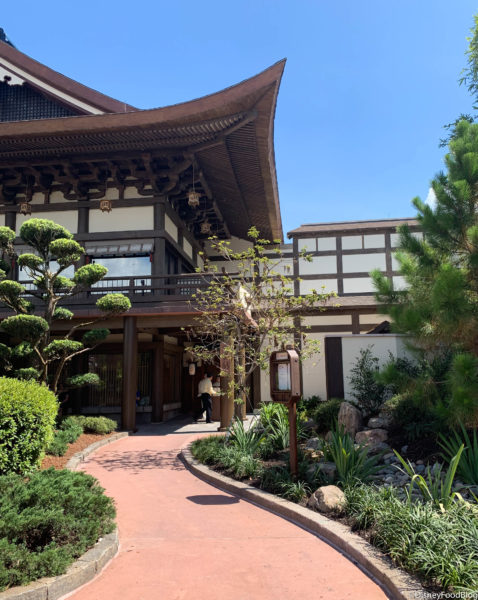



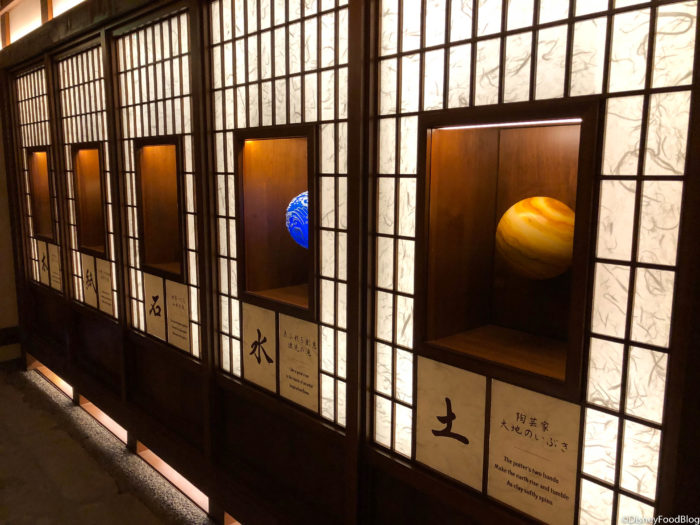





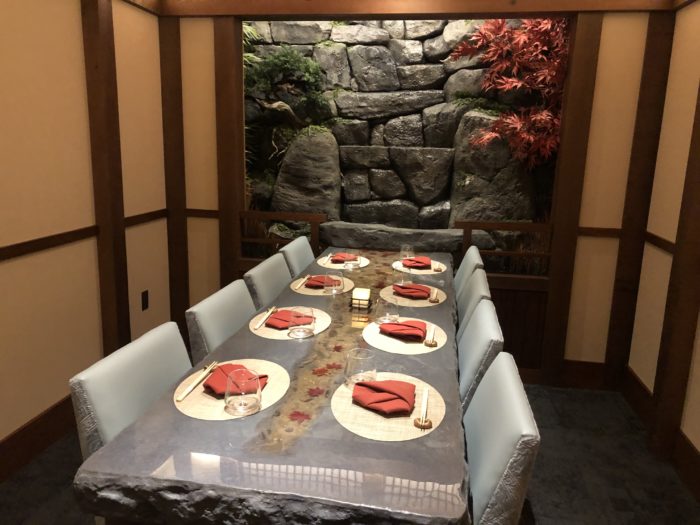
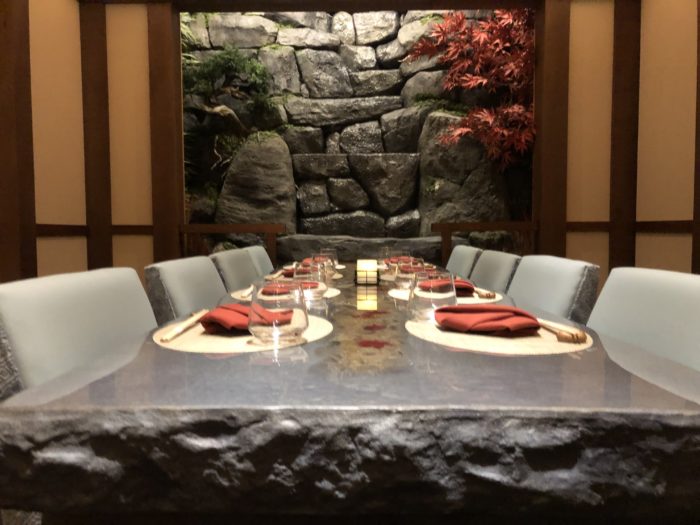
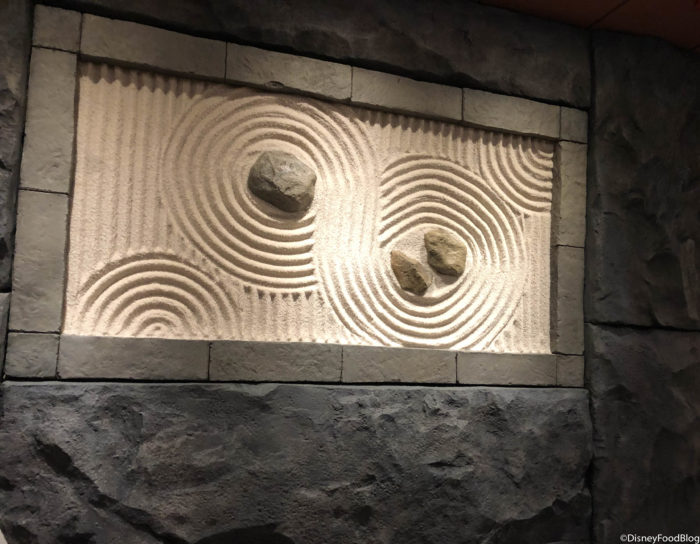

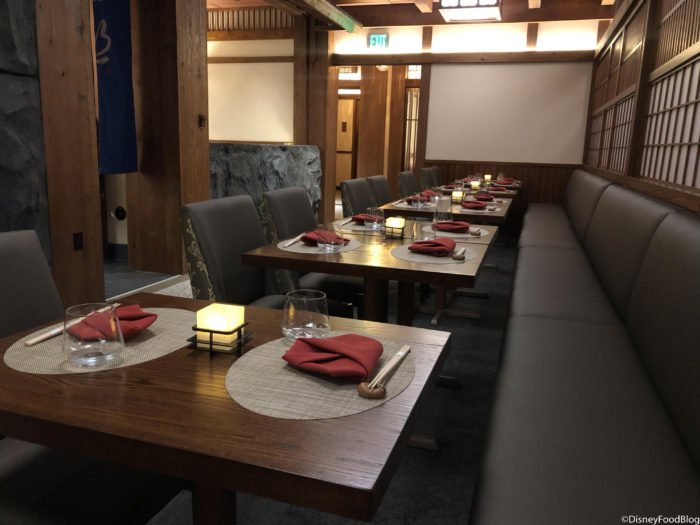

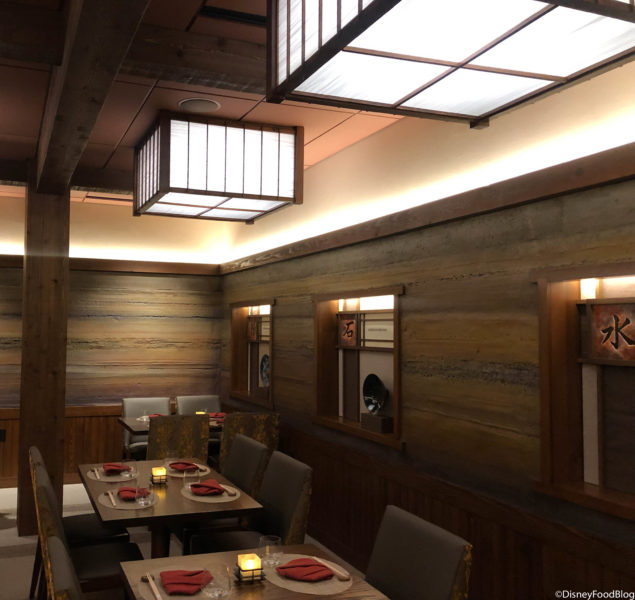
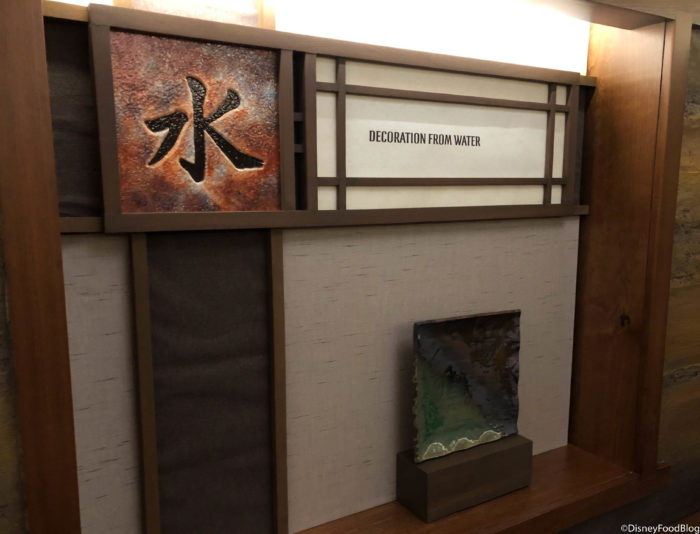

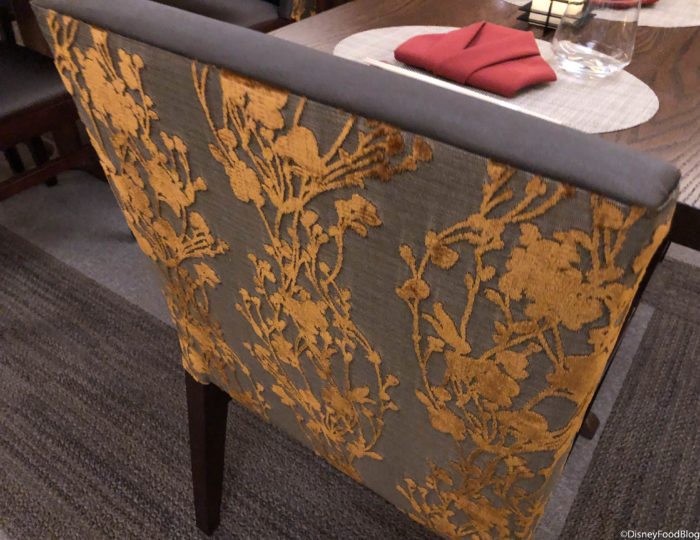
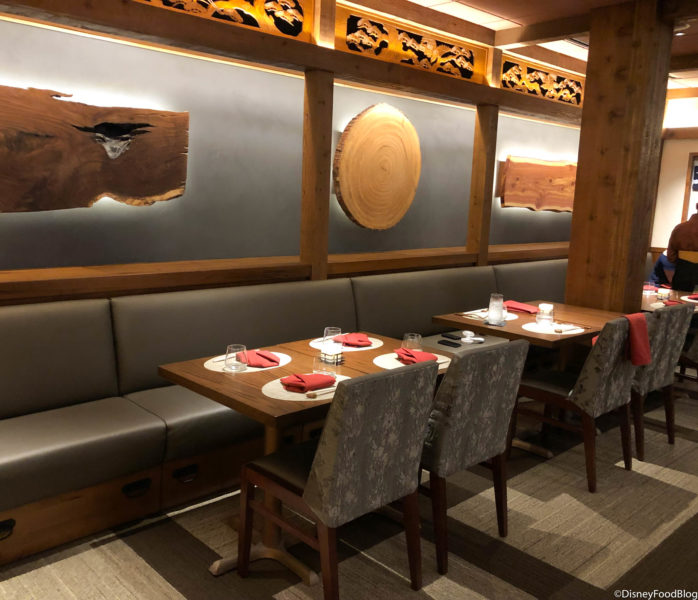
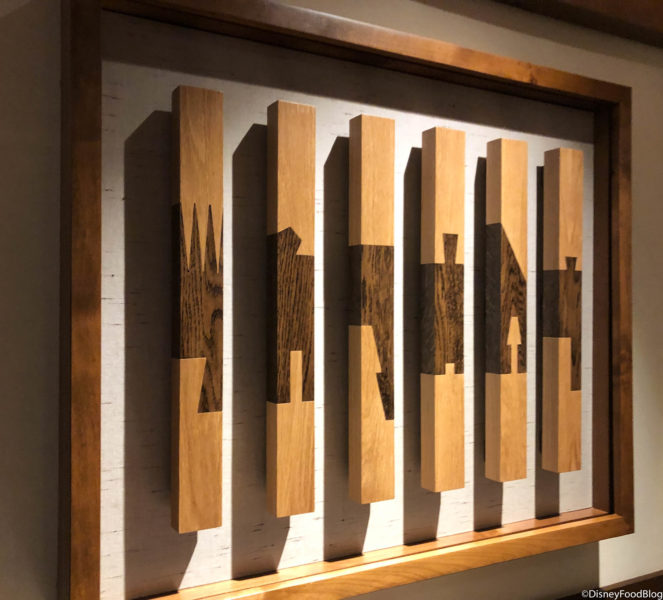



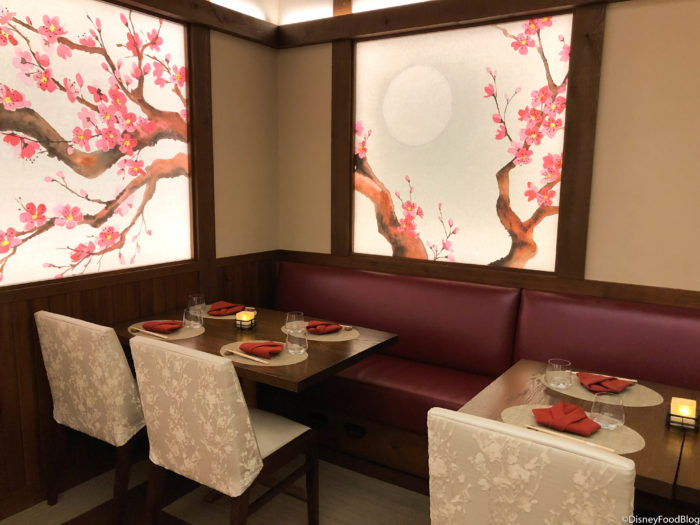

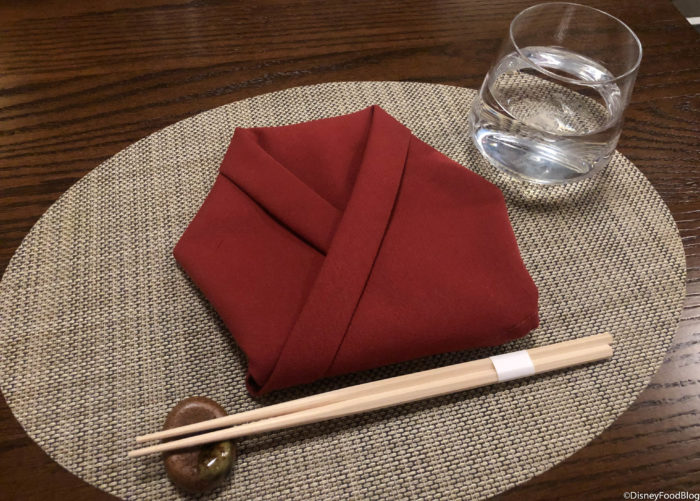
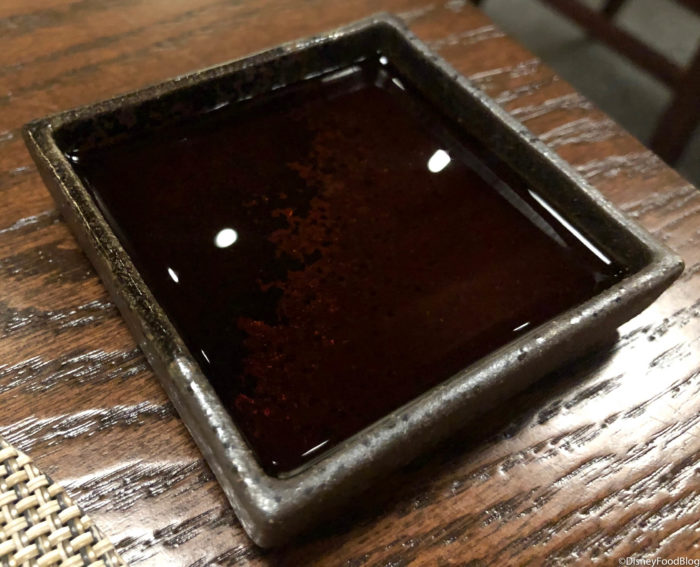

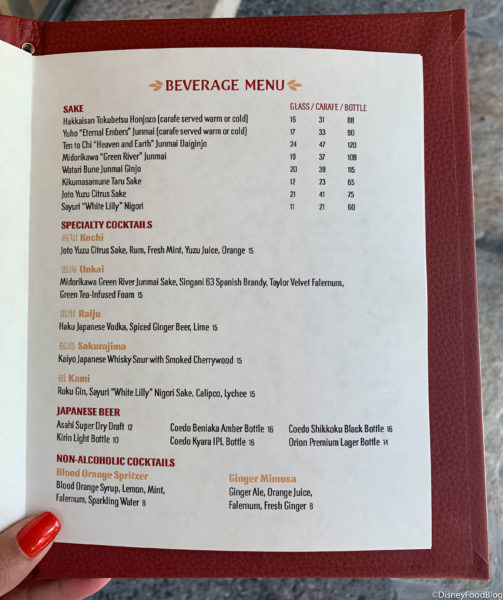
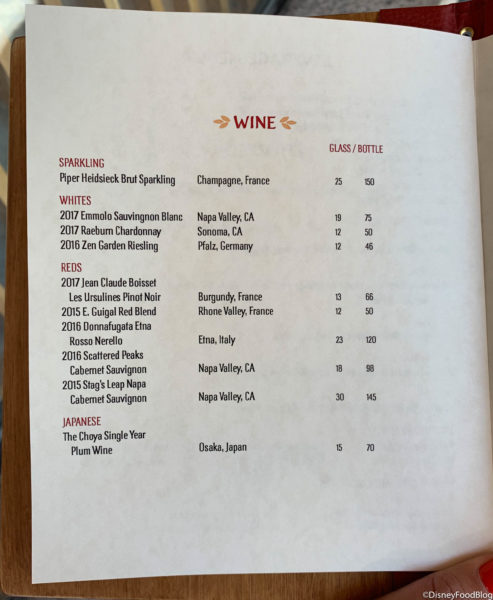

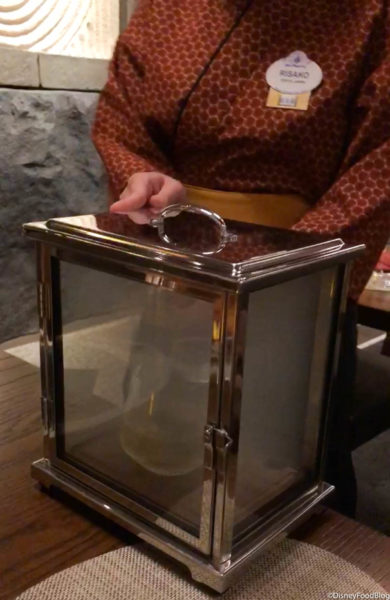
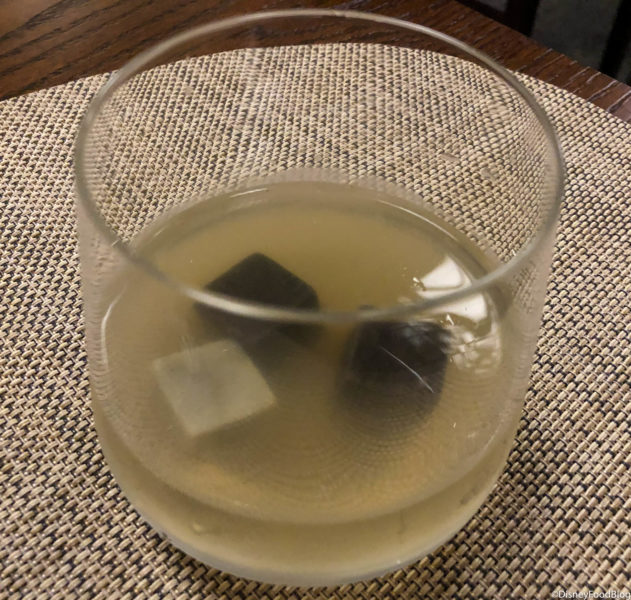
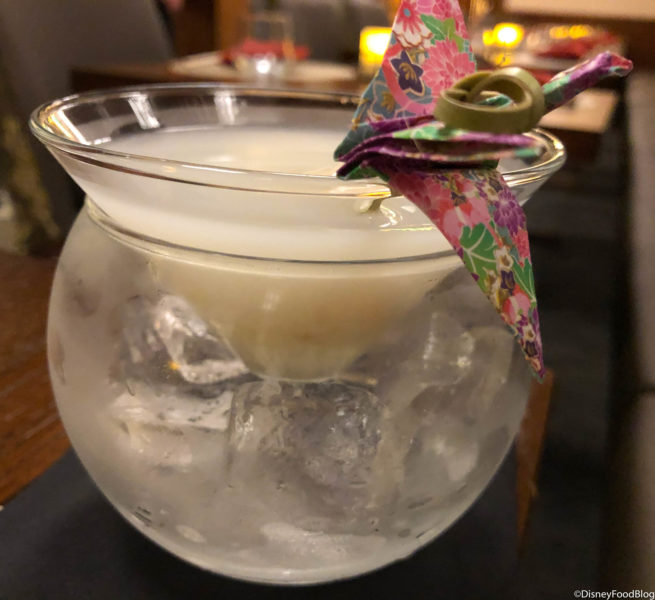

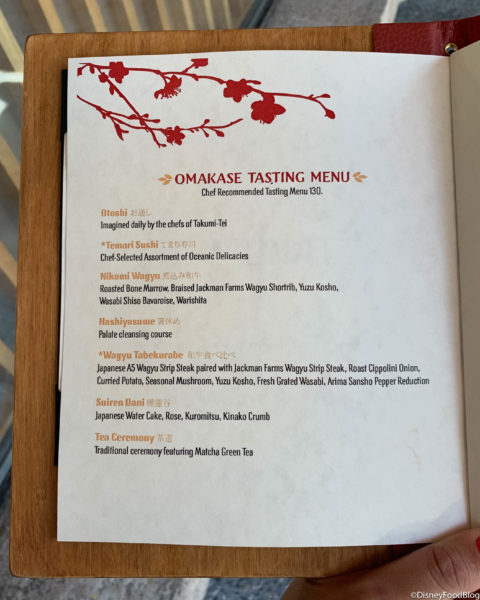
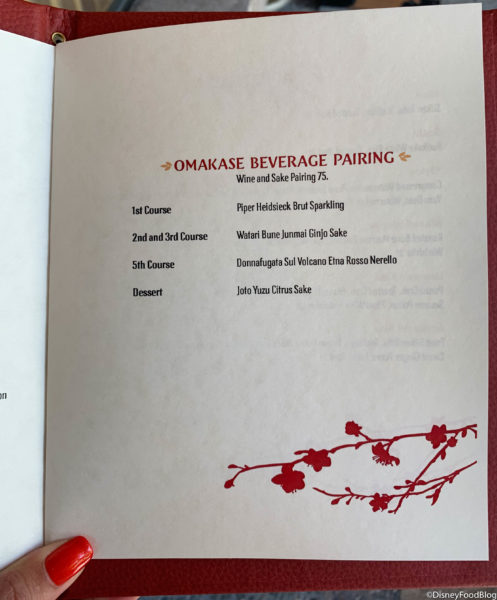

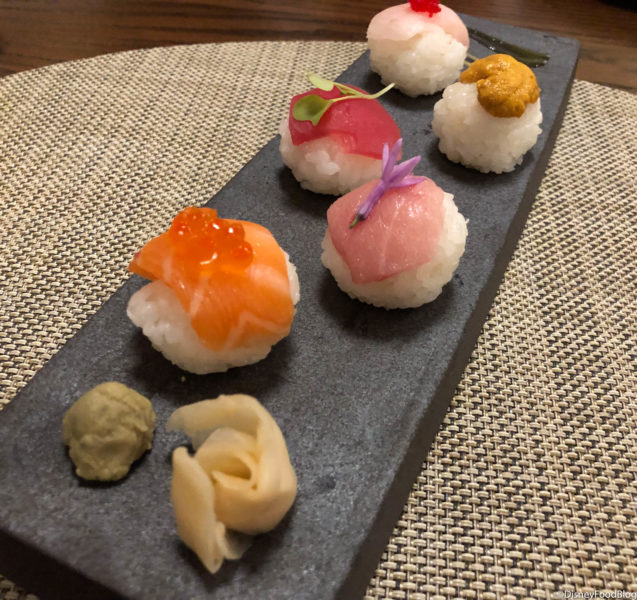

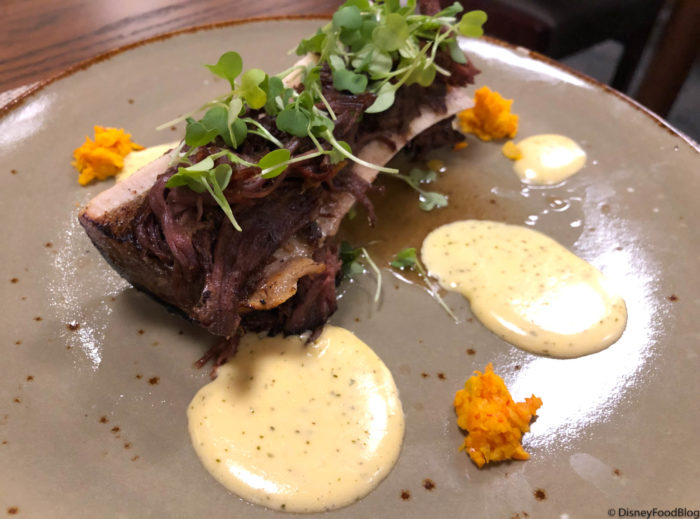









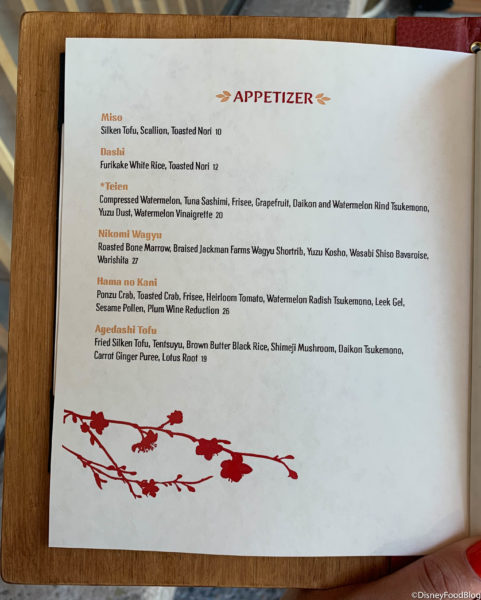
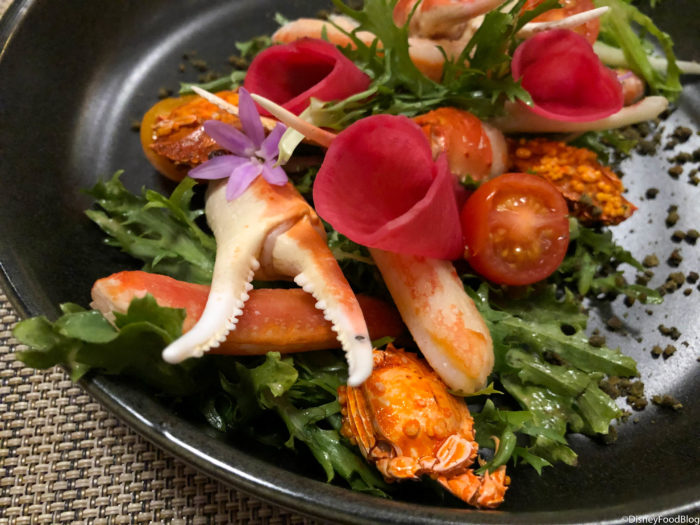













Post a Comment